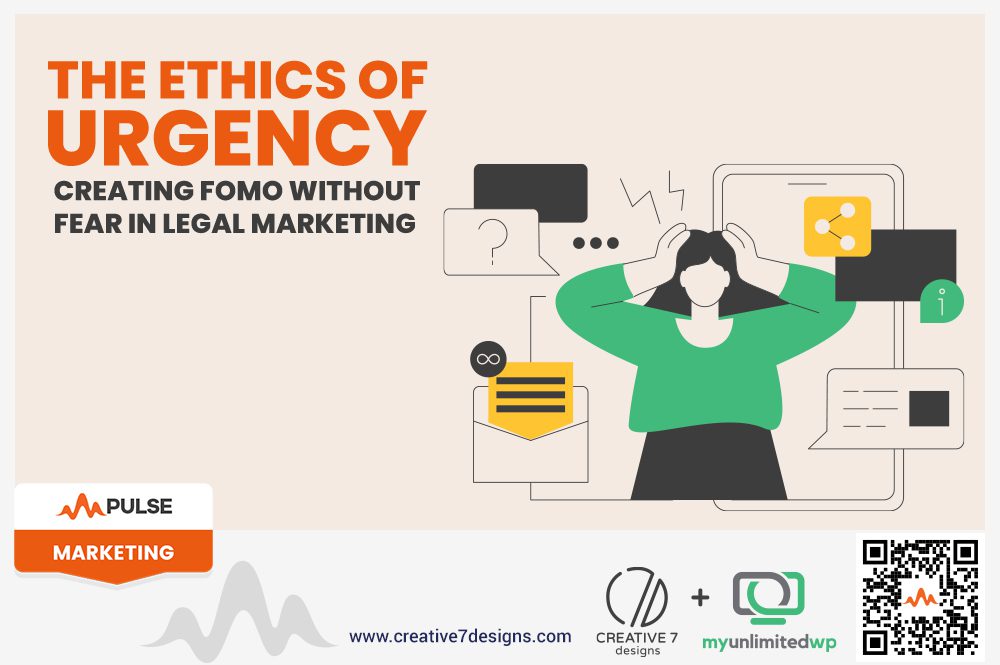Overview: How do you create urgency in legal marketing without crossing ethical lines? Discover how law firms can inspire action — without relying on fear tactics or false pressure. Read on!
If you’ve spent any time studying marketing trends, you’ve probably run across the acronym FOMO — the Fear of Missing Out. It’s a powerful psychological trigger that, when used strategically, can drive action, increase conversions, and make your law firm stand out in a sea of sameness.
But here’s the ethical catch: law firms aren’t selling sneakers or concert tickets.
Legal services sit in a different category — one where fear-based messaging, urgency triggers, and aggressive sales tactics can blur the line between persuasion and exploitation.
So how can law firms use urgency responsibly — without undermining trust or compliance?
Let’s talk about how to create ethical urgency that motivates without manipulating!
Why FOMO Works (and When It Doesn’t)
Urgency works because it speaks directly to human psychology. We’re wired to prioritize what’s time-sensitive, limited, or exclusive. In marketing, that can look like:
-
“Spots are filling up fast!”
-
“Limited-time offer!”
-
“Don’t miss your chance!”
But for law firms, this kind of phrasing can quickly feel inappropriate — or worse, misleading. Legal services aren’t limited-edition products. They’re often serious, sensitive decisions that require trust and clear thinking.
That’s why fear-based urgency should never be your go-to.
Also Read >> The Psychology Behind FOMO (Fear of Missing Out)
The Problem with Fear-Driven Messaging in Law
Let’s be clear: urgency is not inherently unethical. But in legal marketing, playing on fear can damage your firm’s reputation and even invite compliance issues.
What crosses the line?
-
Suggesting people will suffer harm if they don’t act fast
-
Using scare tactics to push services (“If you don’t call today, you could lose everything.”)
-
Imposing artificial deadlines on services that aren’t time-bound
This not only undermines your professionalism — it can also backfire with clients who feel manipulated rather than supported.
So… How Do You Create Ethical Urgency?
Here are five proven, ethical ways to encourage action — without fear:
1. Highlight Real-Time Relevance : Urgency doesn’t have to be artificial. Tie your services to current events, seasonal needs, or real legal deadlines. For example:
-
“New tax regulations just went into effect — here’s how they impact your business.”
-
“Facing an HOA dispute? California’s new mediation rule may affect your case timeline.”
This kind of urgency is rooted in timely value, not panic.
2. Focus on Opportunity, Not Consequence : Instead of saying “you’ll regret not calling,” say “we can help you get ahead of this before it becomes more complicated.” You’re still urging action — but through empowerment, not pressure.
3. Use Availability as a Transparent Signal : If your consultations fill up quickly, say so — honestly. Real scarcity is fine when it’s factual:
-
“We’re currently booking consultations two weeks in advance — secure your spot today.”
No need to hype. Just be clear.
4. Educate with Intent : We keep saying this.. use your content — your blogs, videos, newsletters — to educate readers on why it helps to act sooner rather than later. When people understand the practical benefits of early action, they feel motivated and respected.
5. Let Your CTA Do the Work : Strong calls to action (CTAs) don’t have to sound pushy. They just have to be specific and confident:
-
“Let’s discuss your next step.”
-
“Start your legal strategy today.”
-
“Schedule a consultation before your deadline passes.”
The message is clear: we’re here when you’re ready — but sooner is smarter.
Build Trust, Not Tension
In legal marketing, trust is your currency. Clients don’t want a sales pitch — they want reassurance that they’re making a sound, timely decision.
The most successful law firms don’t pressure. They guide. They position themselves as partners, not predators.
So if you’re looking to spark urgency in your messaging, remember this: creating FOMO doesn’t require fear — just clarity, timing, and empathy.


